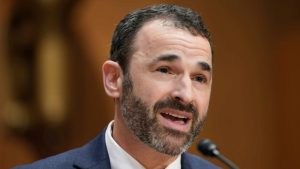3 questions to overcome the fear of success
Fear of failure is natural. It’s a symptom of conscientiousness, and that’s a good thing. But fear of success is a malignant disease fatal to all your hopes and dreams.
Entrepreneurial guru Patrick Bet David tells a story so painfully bewildering I can hardly believe it’s true.
Several years ago, a heavy manila envelope arrived in the office mail. Inside was a thin tablet, on which a young woman had recorded a video pitching herself to become an intern. At the time, no one had seen this kind of tech, and the entire office was apoplectic with wonder and awe. Mr. Bet David immediately sent off a reply inviting the woman to work with him.
He never heard back from her.
Let me repeat that: He never heard back from her.
He was incredulous himself, but I was absolutely incensed. How many aspiring entrepreneurs would kill for the opportunity this woman held in her hands? Yet she simply let it slip away by failing to answer an email that she herself had solicited at significant expense.
Of course, there might be any number of reasonable explanations. Maybe her email account got hacked and frozen. Maybe there was a sudden death in the family. Maybe she won the Powerball and lost interest in business.
But the more likely explanation is a malady that now finds its way into the Ethical Lexicon:
Atychiphobia (a·tych·i·phob·i·a / a-tik-eh-fo-bi-a) noun
The abnormal and persistent fear of failure, to the degree that it disrupts the pattern of one’s life.
In his bestseller, To Sell is Human, Dan Pink explains that we are all in the business of sales. Many of us sell products or services. But all of us sell our ideas, our philosophies, and, ultimately, ourselves.
Even if you’re in the same league as Tony Robbins or Brian Tracey, you may still be overly familiar with the pain of rejected pitches and proposals. For most of us, the anticipation of that pain produces fear. Rabbi Joseph Kahneman, perhaps the most legendary figure in from the world of Jewish fundraising, reported that whenever he knocked on a door, he silently prayed that no one would answer.
Mere mortals like us can find solace in knowing that the most successful salespeople also need to steel themselves against the specter of rejection. However, sometimes that fear of hearing “no” disguises a far more insidious fear: The fear of hearing “yes.”
Imagine you’re a soldier in the military. Your commanding officer gathers your unit together and asks for a volunteer to take on a highly important and extremely dangerous mission. As you stand frozen and debate with yourself whether or not to answer the call, the soldier next to you steps forward.

At that moment, what do you feel? Part of you feels disappointed in yourself. You failed to step up, so someone else plucked away your chance to be the hero. But another part of you feels relief. Now you don’t have to choose between rising to the occasion and remaining safely anonymous among the rank and file.
Did the risk of personal harm outweigh the possibility of glorious achievement? You may never know.
At best, the fear of failure can paralyze us into inaction, so that we miss opportunities for potential success. At worst, it can cause us to sabotage our own efforts, so that we end up snatching defeat from the jaws of victory because we don’t trust ourselves to take up the challenge.
Opportunity carries with it responsibility. Once we commit ourselves, we need to honor our word, fulfill our promises, and deliver the goods so that we establish or preserve our reputations while serving those who put their trust in us. By giving free rein to our doubts and insecurities, they will feed themselves by riddling us with self-defeating questions:
- What if I’m not up to the task?
- What if I fall short?
- What if I can’t pass muster?
The tragic irony is that those who ask themselves those kinds of questions are the ones most likely to succeed by holding themselves to the highest standards. As the celebrated sociologist Dr. Bertice Berry says, imposters don’t suffer from imposter syndrome.
What can you do to combat your inner fears? Flip the script by asking yourself different questions:
- What do I need to work on to ensure that I will succeed?
- How much time do I need to invest to do the best job I can do?
- Which resources can I utilize to hone my skills to their sharpest edge?
These questions serve a dual purpose. First, they guide you toward taking practical steps that prepare you for peak performance. More fundamentally, by asking them you signal to yourself that you can succeed, that you alone are ultimately responsible for your success: not luck, not fate, not happenstance.
Fear of failure is natural. It’s a symptom of conscientiousness, and that’s a good thing. But fear of success is a malignant disease fatal to all your hopes and dreams.
What’s critical to remember is that courage is not the absence of fear. It’s the willingness to confront your fear and not let it get the better of you. Every time you face your fears, you get stronger and more confident, so you can move boldly forward conquering one fear after another.
ABOUT THE AUTHOR
(11)
Report Post







